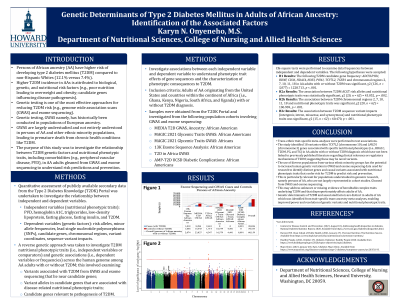Back

Objectives: H1: ADCYAP1R1, BDNF, CD36, HDAC4, NOS3, PON1, TCF7L2, TGFB1 were predominant in adults of African ancestry with or without T2DM.
H2: There is a relationship between HBA1C, TG, LDL, FG, FI and genetic associations among adults of African ancestry and the following:
H2a: ACGT risk alleles
H2b: Chromosomal regions 2, 7, 10, 11, 19
H2c: Sequence variant impacts: intergenic, intron, missense, and synonymous
H2d: Minor allele frequencies < .05
H2e: Lead reference SNPs
H2f: Variant coordinates
H3: ALDH1A1, B3GALT2, C8orf37, CASP16, CCSAP, CDKN2B, CHRNA5, CRNN, CYP7B1, FAT4, FOXP1, GPC6, GRM4, LMCD1, MMP19, MYOM2, NOL11, PHF8, RP11-180C1.1, SLC45A1, SLC9A8, TLE1, ZPLD1 were predominant in adults of African ancestry with peripheral vascular disease in T2DM.
Methods: Quantitative assessment of secondary data in the Type 2 Diabetes Knowledge Portal comprising nutritional phenotypic traits (peripheral vascular disease, hemoglobin A1C, triglycerides, low-density lipoprotein, fasting glucose, fasting insulin) and genetic associations risk allele, minor allele frequencies, reference single nucleotide polymorphisms, candidate genes, chromosomal regions, variant coordinates, and sequence variation impacts) related to Type 2 Diabetes Mellitus (T2DM) among adults of African ancestry with or without Type 2 Diabetes Mellitus to understand T2DM hereditary disease risk.
Results: H1
Results: χ2 (126, n = 5,877) = 1228.713, p < .001
H2a
Results: χ2 (20, n = 62) = 43.052, p = .002
H2b
Results: χ2 (20, n = 62) = 106.969, p < .001
H2c
Results: χ2 (15, n = 62) = 60.470, p < .001
H2d
Results: χ2 (228, n = 60) = 210.000, p = .798
H2e
Results: χ2 (240, n = 61) = 269.118, p = .095
H2f
Results: χ2 (245, n = 62) = 273.529, p = .102
H3
Results: χ2 (264, n = 23) = 276.000, p = .293
Conclusions: Hereditary disease risks for Type 2 Diabetes nutritional phenotypes and genetic associations are distinct in adults of African ancestry with or without Type 2 Diabetes Mellitus diagnosis.
Funding Sources: Howard University
Precision Nutrition/Nutrient-Gene Interactions
(PO27-09-22) Genetic Determinants of Type 2 Diabetes Mellitus in Adults of African Ancestry: Identification of the Associated Factors


Karyn N. Onyeneho, PhD, MS
– Nutritional Genomicist, Howard University, Washington, District of Columbia, United States
Presenting Author(s)
Disclosure(s):
Karyn N. Onyeneho, PhD, M.S.: No relevant financial relationship(s) with ineligible companies to disclose.
Objectives: H1: ADCYAP1R1, BDNF, CD36, HDAC4, NOS3, PON1, TCF7L2, TGFB1 were predominant in adults of African ancestry with or without T2DM.
H2: There is a relationship between HBA1C, TG, LDL, FG, FI and genetic associations among adults of African ancestry and the following:
H2a: ACGT risk alleles
H2b: Chromosomal regions 2, 7, 10, 11, 19
H2c: Sequence variant impacts: intergenic, intron, missense, and synonymous
H2d: Minor allele frequencies < .05
H2e: Lead reference SNPs
H2f: Variant coordinates
H3: ALDH1A1, B3GALT2, C8orf37, CASP16, CCSAP, CDKN2B, CHRNA5, CRNN, CYP7B1, FAT4, FOXP1, GPC6, GRM4, LMCD1, MMP19, MYOM2, NOL11, PHF8, RP11-180C1.1, SLC45A1, SLC9A8, TLE1, ZPLD1 were predominant in adults of African ancestry with peripheral vascular disease in T2DM.
Methods: Quantitative assessment of secondary data in the Type 2 Diabetes Knowledge Portal comprising nutritional phenotypic traits (peripheral vascular disease, hemoglobin A1C, triglycerides, low-density lipoprotein, fasting glucose, fasting insulin) and genetic associations risk allele, minor allele frequencies, reference single nucleotide polymorphisms, candidate genes, chromosomal regions, variant coordinates, and sequence variation impacts) related to Type 2 Diabetes Mellitus (T2DM) among adults of African ancestry with or without Type 2 Diabetes Mellitus to understand T2DM hereditary disease risk.
Results: H1
Results: χ2 (126, n = 5,877) = 1228.713, p < .001
H2a
Results: χ2 (20, n = 62) = 43.052, p = .002
H2b
Results: χ2 (20, n = 62) = 106.969, p < .001
H2c
Results: χ2 (15, n = 62) = 60.470, p < .001
H2d
Results: χ2 (228, n = 60) = 210.000, p = .798
H2e
Results: χ2 (240, n = 61) = 269.118, p = .095
H2f
Results: χ2 (245, n = 62) = 273.529, p = .102
H3
Results: χ2 (264, n = 23) = 276.000, p = .293
Conclusions: Hereditary disease risks for Type 2 Diabetes nutritional phenotypes and genetic associations are distinct in adults of African ancestry with or without Type 2 Diabetes Mellitus diagnosis.
Funding Sources: Howard University

.png)
